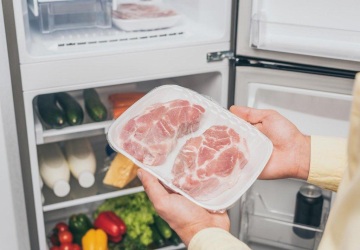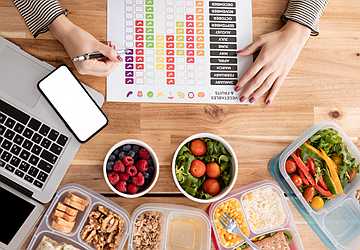health
Nearly one-third of the world's population discards or wastes food for various reasons. That's equal to a billion tons every year. That's why food waste has become the biggest problem in the world.
The World Resources Institute declares that discarded food also wastes much water. Approximately 24% of water is used in agriculture to nourish healthy grown food.
If you think food waste doesn't affect you, someone's misleading you. Wasting edible foods tosses your hard-earned money. Also, landfill sites get filled with discarded food rots that produce methane gas since it's a greenhouse gas, disturbing the overall climate change.
An average consumer doesn't pollute much more than an environmental polluter. So, there's a need to find ways to reduce food waste throughout the day.
8 Tips To Reduce Food Waste
Learn the rules of avoiding food wastage at home, school, or wherever you go.
1.Buy Less
As a consumer, it's in your hands to avoid food waste. You might love a packed fridge because it looks appealing. But eating only some food will get stale, resulting in food wastage.

Please take a few trips to your nearby markets and make plans to reduce food wastage by storing it all at once. Always make a shopping list before heading for the grocery. Please keep it in your kitchen; add stuff you want. That helps avoid buying unnecessary food already at home. Otherwise, dumping all food in the fridge is another source of waste.
2.Think Before Throwing Food
Foods past their prime have not to be thrown in the garbage. If food appears usable, it's OK to eat it. Although soft or wilt, veggies aren't stale but ripe; they can be added to soups, sauces, and baked dishes.
Also, water vegetable stems of broccoli and celery to keep them fresh. Leftover vegetable scraps make a perfect soup stock.
3.Organize the Kitchen
Want to keep track of your pantry? Organize foods in your fridge and kitchen to know what you have and what's ready to eat.
Many grocery stores and restaurants organize food and reduce waste through a helpful way — FIFO as 'first in' and 'first out.' Place old food items in the front row to use first and newly bought stuff at the back to ensure freshness. When placing tin cans at home, keep the ones with the closest expiry date in the front row of the cupboard or fridge.
4.Refrigerate Food
Storing perishable food items such as fruits and vegetables is necessary to prevent spoilage. But you must know the right way to keep it.
Fruits release natural gasses that spoil nearby foods faster. That's why keeping all the perishable food away from each other is better. For example, keep apples, tomatoes, and other fruits apart to eat them fresh.

Another way to avoid food wastage is by storing leftovers in the fridge and freezer. You can use them in your meals at least two days a week. It not only reduces waste but also keeps the fridge tidy.
If you've cooked pasta or chicken with sauce dips, freeze the sauce in a separate container for use next time. Mash beans or blend pulses with garlic, herbs, and lemon juice to make a hummus-style dip. Turn over-ripe tomatoes, cucumbers, and avocados into salsa.
Follow a few tips to avoid food spoilage:
·Set the refrigerator's temperature below five °C (if it's not between 0 to 5°C, milk turns warmer)
·Store raw food below cooked food on fridge shelves
·Use sealed air-tight containers to store food
·Don't leave leftovers open. Store them in suitable containers.
5.Make a Weekly Menu
People promote cutting back on waste and organizing their food usage. They plan meals for a week. You can use cookbooks and online sites to prepare meals and compile a shopping list. This way, you know what to cook each day, hence avoiding bringing unnecessary food for meals.
Getting the menu right or sticking to it might be challenging, but it builds a perfect routine. You'll not have to do guesswork around meals every day.
6.Log of Spoiled Foods
You better know what's spoiling in your fridge. Write down to identify which foods stay fresh for a short time. If you find oranges or grapes wrong, buy fewer oranges to finish within days rather than many for weeks.
Buying a few bags of food rather than purchasing larger bags saves tons of money. You are throwing away spoiled food, which wastes a lot of dollars. So, beware of the food items you are buying.
7.Freeze Extra Food
They have extra food, so why not freeze them? Preserve foods in your freezer. If you have dozens of fresh fruits and vegetables, freeze them to extend their life. Also, it prevents spoiling and reduces waste.
Freezing other food items, including meat, bread, or cooked dishes, preserves and stays longer.
Most people don't freeze herbs because they stay well without them. But freezing them turns out to be helpful. If you've bought extra in-season fruits and vegetables, freeze them. It's a step towards sustainable eating as you can enjoy it when out of season.
Frozen fruits and veggies lose their texture; make puree or stew them to retain their freshness. For example, make tomato ketchup or sauce for pizza and pasta, add stewed apples in porridge or bread, and pour strawberry puree on fresh fruits, desserts, or smoothies.
8.Food Preservation
Have you accidentally bought too much food? Instead of throwing them away, it's better to preserve these foods. Proper canning and pickling help store food for several months or even years.
You can pickle anything, from onions to garlic. That's the best way to preserve food and avoid wastage. Turn apples into applesauce, strawberries into strawberry jam, and mango, cucumber, or lemon into pickles.
Conclusion
Industrialized countries lie in the food-wasting category more than developing countries.
When you waste food, all the resources or ingredients used to produce it are destroyed. So, use efficient methods to avoid food spoilage and reduce wastage.







